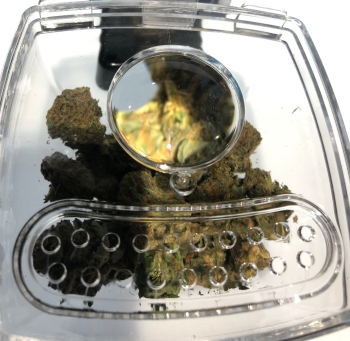
Legalities of creating edibles
March 27, 2019
By
Bakers Journal
The Cannabis Act presents challenges and opportunities for food industry professionals
 Image of Blueberry Kush
Image of Blueberry Kush Bill C-45, The Cannabis Act, had passed in Senate on June 20th, 2018. This allows adult Canadians to legally posses and use cannabis and THC or CBD-infused products. This creates both opportunities for people in the food industry, as well as some challenges.
The legal age for cannabis consumption is 19 for most provinces, with the exception of Alberta and Quebec where the minimum age to purchase and consume is 18. A survey from the Angus Reid Institute in early 2018 suggested that three-quarters of Canadians believe the minimum age to purchase and consume cannabis should be raised from the current age of 18.
While the Angus Reid poll is only one measure of Canadians’ caution, many see legalization as an opportunity. Molson Coors Canada has partnered with cannabis producer, The Hydropothecary Corporation to produce cannabis-infused beverages. Lifford Wines has expanded their offerings to include various strains of marijuana. Some caterers, such as High Society in Toronto, capitalize on legalization to offer a gourmet environment to enjoy edibles.
What are some considerations that your bakery, catering company, restaurant or confectionary should consider before taking the leap into edibles?
The difference between THC and CBD
Tetrahydrocannabinol, known as THC, is the psychoactive ingredient in cannabis. In other words, it is the active ingredient that will produce a high. CBD stands for cannabidiol, and it is less psychoactive; It is used as a non-hallucinatory painkiller. Some sports drinks or energy drink manufacturers are looking to apply its use as a functional sports drink that could help with recovery.
What are the legal limits?
For edibles like chocolates, candies and baked goods, the limit is 10 mg of THC per package, (identified by the Canadian Government as a “unit”) and the same amount applies for loaded drinks, or THC-infused beverages. Scaling presents a challenge, when attempting to calculate the amount of THC per unit. Jesse Burns, the marketing director for Sweet Grass Kitchen adds that there are ways to infused THC into food, extraction and infusion.
If you are creating a batch of items, for example, a box of loaded cookies or brownies, the single unit’s legal amount of THC is capped at 10 mg; however, your entire bag of cookies, or container of pot brownies must not exceed 1000mg for the package.
Letting cannabis infuse its oils by heating it with butter to create a cannabutter is one way to infuse foods with THC. However, products with large mix-ins and large pieces can present a challenge to create a homogenously even dose of THC in a product.
Extraction is a way to release oils, which is later added to edibles. A common solvent for separating THC from cannabis is CO2, which produces a mid-range potency that can be added to baked goods. Some other methods to process THC include distillation and isolation.
A general rule of thumb for baking is the higher the potency, the more milligrams of THC to use in your products. By nature, cannabis oil with higher potency has less actual plant material, and can mean a baked good with less or almost no distinctive cannabis flavouring.
It is strongly recommended by the Canadian Government for those who want to get into the edibles market to get a licensed third-party laboratory to test the potency and the quality control in order to pass inspection.
Packaging
Packages have to be clearly labelled as containing THC and/or CBD. A standardized cannabis symbol for your products that contain THC must be prominently displayed along with a health warning message. The package must also clearly state the content (how many milligrams of THC) each unit contains.
Like all packaged items, it must include an ingredient list, and itemize any potential allergens, among them such items like peanuts, tree nuts, eggs, soy and wheat.
Packages must be child-resistant, and not have any added vitamins, minerals and no added caffeine nor alcohol. For those creating THC infused candies, no sugars, colours or sweeteners are allowed, and must not be made “appealing” to children as the Canadian Government’s Cannabis resource page admonishes.
Travelling and Exportation
Canadian companies engaging in the cannabis industry in the U.S. may face risks of prosecution or penalties under U.S. law and regulations. It is still considered illegal to travel with any item that contains THC or CBD, as the prohibition lift in Canada did not change the border rules to traveling to or within the U.S.
It is prohibited to export or import cannabis for any purposes other than medical or scientific under the Cannabis Act. It is recommended to seek advice from legal counsel should you consider a prospective export market abroad.
Licensing
Assuming bakers and confectioners are making edibles for recreational purposes and not medicinal, an authorized Provincial and Territorial Sale, and a Federal Sale Licence (Non-Medical) are needed. Anyone creating pot-infused edibles would need a This would be for any vendor who intends to sell their goods by phone, online with secure home delivery in in provinces and territories without authorized sale system.
Research authorization and import and export permits may also be needed if your intent is selling outside of your province, territory, or even out of country.
As always, seek legal counsel prior to manufacturing, packaging or importing any of your products. It is the responsibility of the applicant to read and understand all the applicable requirements and any associated guidance found on the Health Canada website before applying. /BJ
Print this page
Leave a Reply